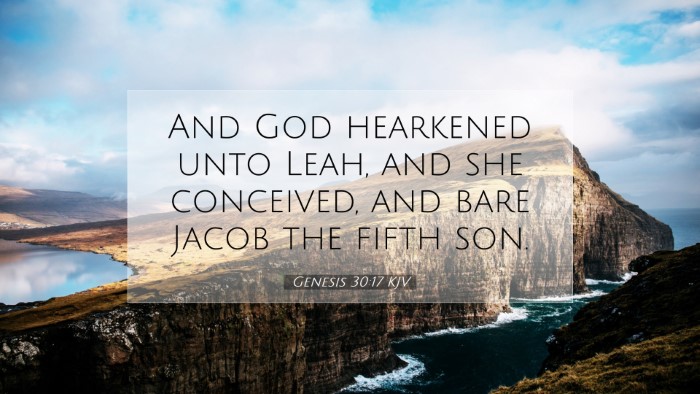Commentary on Genesis 30:17
Verse Context: Genesis 30:17 states, "And God hearkened unto Leah, and she conceived, and bare Jacob the fifth son." This verse comes during a crucial moment in the narrative of Leah and Rachel, the wives of Jacob, highlighting themes of divine intervention and family dynamics in the context of rivalry and the fulfillment of promises. This commentary seeks to examine the significance of this passage through the insights of respected theologians.
Divine Response and Intercession
Matthew Henry emphasizes the graciousness of God in hearing Leah's petition. He argues that Leah, despite being overshadowed by Rachel in beauty and love, experienced God’s attention due to her genuine suffering and desire for affirmation. Henry suggests that Leah's experiences reflect the human condition—seeking approval and the deep need for recognition from others. The conception of her fifth son signifies God’s acknowledgement of her plight and His willingness to respond to the cries of the marginalized.
Theological Implications
Albert Barnes provides a theological lens through which to view this verse, positing that Leah's conception is indicative of God's sovereign will and His active involvement in human affairs. Barnes notes that the act of conception is a divine act, illustrating that life and fertility are ultimately governed by God. This challenges believers to recognize that God is intimately involved in their lives, often in ways that may not be immediately apparent. In Leah’s case, her heartbreak and struggle ultimately served a divine purpose in the lineage of Israel.
Symbolism of the Sons
Adam Clarke expands on the symbolic nature of Leah's children. The fifth son, born after a sequence of envy and competition with Rachel, represents a turning point. Clarke indicates that Leah’s sons collectively symbolize the tribes of Israel. Each name and birth signifies not just personal but communal identity. In this instance, the significance of the number five can also point to grace, as five is associated with God’s favor. Clarke draws attention to the biblical numerology and what these numbers entail within the larger narrative.
Leah's Emotional Journey
Leah’s emotional experience is pictorial of the struggles many face in seeking acceptance. Henry comments on the contrast between Leah’s earlier reactions to her sons' births and her emotional state at this point. Whereas the earlier births were marked by expressions of hope for Jacob's love, the birth of her fifth son reveals a shift from merely seeking Jacob’s affection to recognizing her own value in God’s eyes. This transition is significant for those journeying in faith, suggesting that true worth comes not from human relationships but from divine acknowledgment.
Lessons for the Faithful
Spiritual Reflection: From this verse, pastors and theologians can draw a rich tapestry of lessons:
- Divine Attention: God is attentive to the cries of the downtrodden. This resonates with themes throughout scripture where God hears and acts on behalf of the oppressed.
- God's Sovereignty: The narrative reinforces God’s sovereignty over human affairs, particularly in situations marked by strife and competition.
- Identity in God: Leah's journey illustrates that true identity is not found in the validation of others but in being known and accepted by God.
- Purpose in Pain: Struggles, whether relational or emotional, can serve a higher purpose in fulfilling God's plans. This is a message of hope to those enduring hardships.
Conclusion: The Richness of God’s Grace
The story encapsulated in Genesis 30:17 reminds believers of the depth of God’s grace and the myriad ways He works through human history. Leah's experience teaches essential truths about divine providence, human longing, and the creation of legacy through obedience and faith. As pastors, students, and theologians reflect upon this passage, it serves as a poignant reminder of God's ongoing narrative within each believer's life, inviting all to seek His heart amidst life's complexities.


